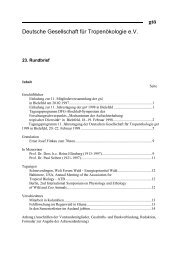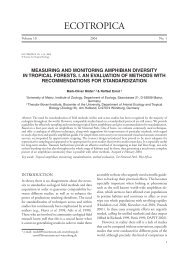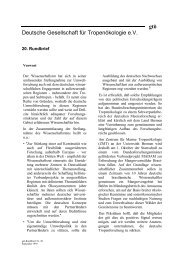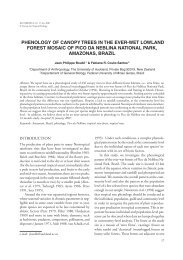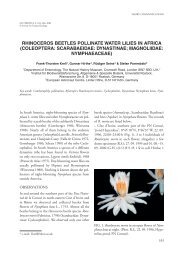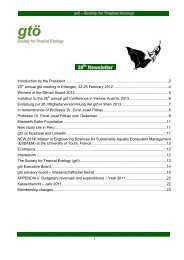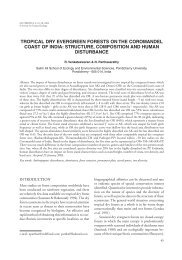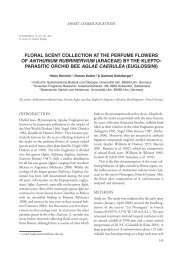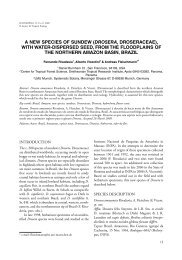Abstract booklet - gtö – Society for Tropical Ecology
Abstract booklet - gtö – Society for Tropical Ecology
Abstract booklet - gtö – Society for Tropical Ecology
You also want an ePaper? Increase the reach of your titles
YUMPU automatically turns print PDFs into web optimized ePapers that Google loves.
112 PARALLEL SESSION HALL H III | BIODIVERSITY SCIENCE & POLICYPARALLEL SESSION HALL H III | BIODIVERSITY SCIENCE & POLICY113INTERGOVERNMENTAL PLATFORM ON BIODIVERSITY ANDECOSYSTEM SERVICES IPBES - STATUS AND CHALLENGESCHINA’S DEVELOPMENT: A COMPARISON BETWEEN A RISINGECONOMY AND ITS BIODIVERSITY IMPACTAxel Paulsch 1Torsten Sprenger 11Helmholtz Centre UFZ, Leipzig, DE, axel.paulsch@ufz.de1University Göttingen, Göttingen, DE, torstensprenger@web.deWEDNESDAY 15:30 Hall H IIIThe Intergovernmental Plat<strong>for</strong>m on Biodiversity and Ecosystem Services (IPBES)will serve as a new scientific advisory body <strong>for</strong> biodiversity related politicaldecision making. The process of establishing took several years and is stillongoing. Three international meetings invited by UNEP were needed be<strong>for</strong>e inJune 2010 the final meeting in Busan (Korea) came up with an agreed text, thatis now handed over to the UN General Assembly (UNGA). The IPBES will havethe main task to per<strong>for</strong>m assessment on biodiversity related topics on global,regional and local scale, to <strong>for</strong>mulated policy options and to in<strong>for</strong>m aboutconsequences of taking or missing these options. The scientific quality of theseassessments shall be guaranteed by transparent methods, best available dataand a peer review process. All UN member states will be part of the plenaryof IPBES, other organsiations will have access but no voting rights. A secondtask of IPBES will be to support capacity building <strong>for</strong> developing countries. Thefinancing of IPBES will be based on voluntary contributions.As the process of establishing is still ongoing (including <strong>for</strong>mal acceptance bythe UNGA, building up a secratariat, defining topics <strong>for</strong> first assessments) thepresenatation will report on the most recent status and the cahllenges to makeIPBES really working.China fuels the actual global economic rise and buffered its last crisis with acomparatively strong and constant growth. This indicates that China willbecome a reliable economic part in future, with global relevance towards thepolitical, ecological and economical development. But on the other hand as anew global player, its influence and pressure on social systems and ecosystemsis predicted to become much more significant than known today. Consequentlythe international community gets more and more interested in China’sresponsibility e.g. in nature conservation, environmental policy or within theclimate change discussion. Within this the protection of biodiversity has beenidentified as one major field where China can play a key role in future.While China’s economic success is mainly driven by the demand of <strong>for</strong>eignstates, the domestic development and production is often not sustainable. E.g.inefficient agrarian and <strong>for</strong>estry production systems still damage intact naturewith great impact on biodiversity. Moreover the exploitation of mineral andenergy resources is often linked with huge impacts on related ecosystems.In<strong>for</strong>mation about these problems is often ambiguous. But it becomes aquestion <strong>for</strong> the future strategic development especially <strong>for</strong> neighbouringstates and the rural development of China itself, if biodiversity as fundamentalbasis can not be efficiently sustained. There<strong>for</strong>e sound in<strong>for</strong>mation play a keyrole <strong>for</strong> policy within decision making processes.This paper reviews China’s economic development regarding biodiversity andeconomic indices, identifying contradictory in<strong>for</strong>mation and key areas <strong>for</strong>further scientific research.WEDNESDAY 15:45 Hall H IIIgtö<strong>Society</strong> <strong>for</strong> <strong>Tropical</strong> <strong>Ecology</strong> | Gesellschaft für Tropenökologie e.V. Status and future of tropical biodiversity | Frankfurt, 21 - 24 February 2011gtö



